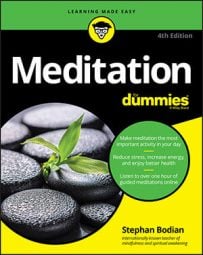Besides, researchers like Dean Ornish have found that a sense of belonging or connectedness with others not only improves the quality of life, but also increases longevity. In one study, people who answered yes to the questions “Do you draw strength from your religious faith?” and “Are you a member of any organization that meets regularly?” were seven times more likely to survive open-heart surgery than those who answered no.
In another study, women being given the same conventional treatments for metastatic breast cancer were divided into two groups: one that met together once a week for mutual support and one that didn’t. After five years, the women who met had lived twice as long as the ones who didn’t.
On a more practical level, you may simply find encouragement from other meditators to persist at what may sometimes seem like a tedious pursuit. And you can discuss your practice and get useful suggestions based on others’ experiences. They may already have solved the problems or traversed the terrain that you’re just encountering.
You have several options for finding others to meditate with: You can seek out a group or class that’s already meeting, form a group yourself, or attend a weekend workshop or group retreat.
Joining or forming a meditation group
Now that meditation has become a more mainstream pursuit, it’s easy to find classes at readily accessible venues like local meditation centers, churches or synagogues, adult-education programs, community colleges, fitness centers, and yoga studios. The problem is, you may not be drawn to the technique they’re teaching, or you may already know how to meditate and simply want the support of other warm bodies.If you can’t find a suitable class, you can ask friends who meditate or check local bulletin boards or the classifieds for ads announcing the formation of leaderless groups. You can also check Meetup.com, which has become a go-to place to find established or newly forming local groups, many of which are leaderless. Or you could take the initiative and form such a group yourself!
Participants don’t have to practice the same technique or hold the same spiritual or religious beliefs. They just have to be willing to sit quietly in the same room together doing whatever they do. You could begin with a reading from the world’s spiritual literature, if everyone seems amenable, and you might end with discussion or a Quaker-style silence in which people offer whatever the spirit moves them to share. Or you can just convene, sit quietly, smile at one another, and leave. The form is up to you.Attending your first workshop or retreat
If you want more in-depth instruction and guidance, you can sign up for an extended period of group meditation. Many of the organizations dedicated to meditation have regional centers that offer individual instruction and workshops, groups, and/or retreats. And many established teachers offer online workshops and retreats that enable you to study and practice without leaving home, wherever home happens to be.Of course, if you’re feeling adventurous, you can always head for one of the main monasteries, communities, or ashrams and get a taste of what it’s like to live with a group of people whose primary focus is the practice of meditation.
Be sure you know in advance what you’ll be doing on your retreat, and be wary of the tendency among some groups to proselytize for their own particular faith or ideology — unless, of course, you happen to be interested in those beliefs.
No matter how relaxed the atmosphere or gentle the approach of the retreat, you may feel a little scared at first because extended periods of silent meditation don’t provide any of the usual diversions, such as cellphones or computers, that keep you from facing yourself. So don’t be surprised if you sign up and then conjure all kinds of great reasons for canceling at the last minute, from sick kids to business emergencies. Stick with your original intention and go anyway. You’ll be glad you did.
Here are a few other reasons you may come up with for putting off your first workshop or retreat along with some rejoinders:- “I’m not good enough yet.” Understandably, you may shudder at the prospect of sitting quietly for three or four hours (or more!) each day when you’ve had difficulty mustering the patience for even 15 minutes. But don’t let your reservations stop you. You’ll be surprised and pleased by how deep your concentration can go and how long you can sustain it when you have the support of a teacher and a group of like-minded people.
- “I have back or knee problems.” If you have serious physical limitations, you may need to take special precautions and even follow a modified schedule, but don’t be daunted or deterred. Just be sure to let the retreat leaders know beforehand so they can help you get comfortable. If you merely suffer from the usual aches and pains that accompany sitting, however, you may be pleased to discover that they actually improve or become less distracting during the course of your retreat. Many teachers also offer instructions for working with discomfort during retreat.
- “I don’t have the time.” What do you mean, exactly? Are you suggesting that every spare moment between now and next Christmas is booked in advance? Or do you really mean that you’d rather do other things with your time? Well, no problem. But if you decide you’d like to attend a retreat, The time will materialize like magic. And who knows? You may find that the insight and peace of mind you bring back buys you more time than you spent.

